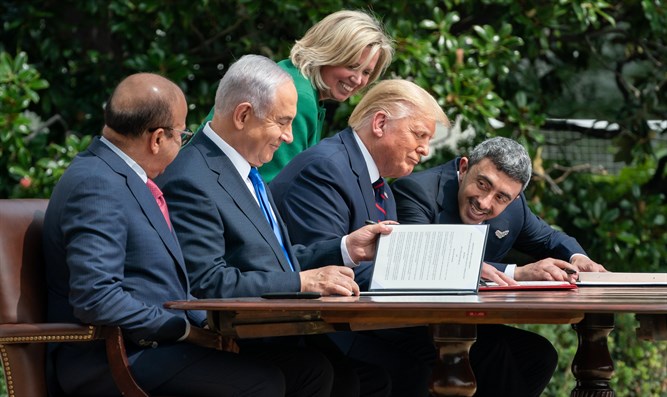UAE Ambassador to the US Yousef Al Otaiba says Middle East divided into extremist and pragmatist camps.
United Arab Emirates Ambassador to the United States Yousef Al Otaiba spoke about the Abraham Accords and the changing political makeup of the Middle East in an address to the online session of the Institute for National Security Studies (INSS) Wednesday.
Addressing the growing relationship between Israel and the UAE, Ambassador Otaiba said: “We are optimistic and enthusiastic about this relationship. I hope Israelis are equally excited to get to know our people, heritage and values – not just our shiny buildings and nice airports.”
“Having trade, investment, research, a joint space program – it’s good for our two countries. As for me, I promised a good friend of mine we’ll visit Israel when the time is right, as soon as Covid is a little more under control & things look somewhat more normal,” he said,
“We still believe the 2 state solution is the only game in town. You need to move forward with this. The Palestinians are not going away. At the end of the day – all we can do is create the space. We’re going to have tough conversations with the Israeli government about the Palestinians and the Palestinian state. This requires diplomacy and more importantly willingness and political courage from the leaders to make compromises and resolve this issue.
He said that he was proud that the UAE was the first Gulf State to normalize ties with Israel. “What we did with Israel kind of broke the ice and broke the taboo. This is no longer impossible. Bahrain and Sudan followed right after, this is not one or two countries doing something unconventional. This is a trend, a pattern.”
“I was talking to a young gentleman from the Economic Department in Abu Dhabi and he said they’re overwhelmed by the number of Israeli companies that want to set up businesses in Abu Dhabi. I took that as a very good sign.
Addressing the political make-up of the Middle East, Otaiba said that “our part of the world is divided into 2 camps: (1) Turkey, Iran and Qatar that promote radicalization and inject religion into any debate; (2) UAE, Bahrain, Jordan, Egypt and Saudi Arabia – who are more focused on a pragmatic approach and their future.”
“This is the big fault line in the middle east today, the defining conflict of ideologies. We think our approach is better for us, for our societies and for our kids. There are other countries who just prefer to look backwards and focus on religion and extremism.”
(Arutz 7).






